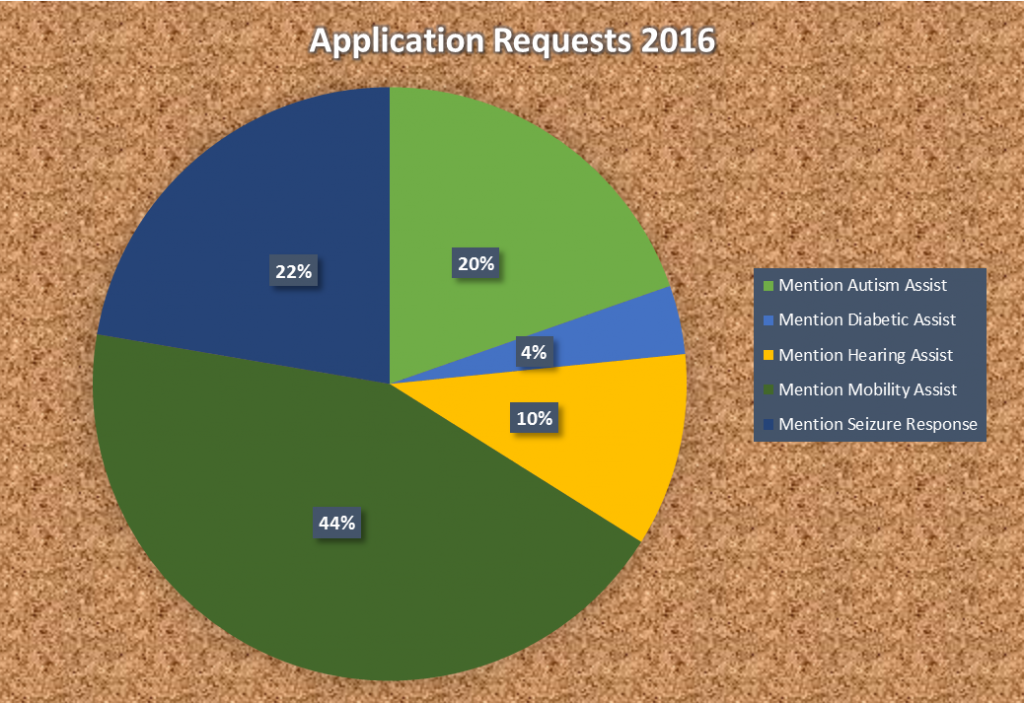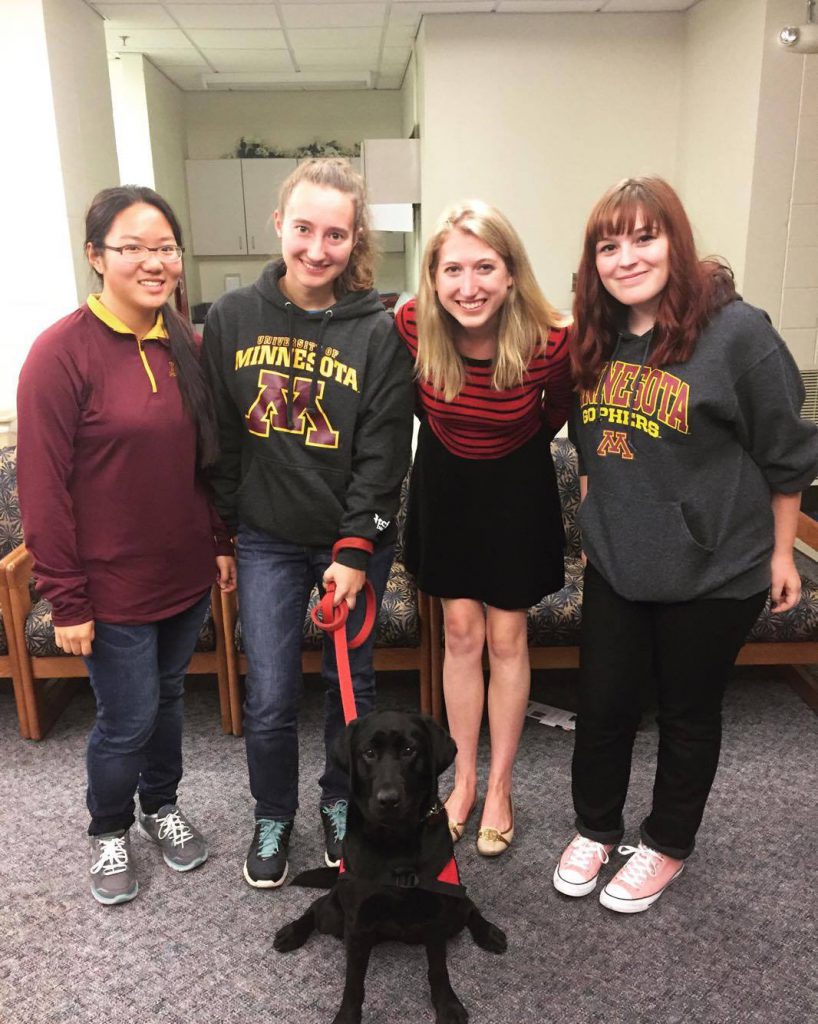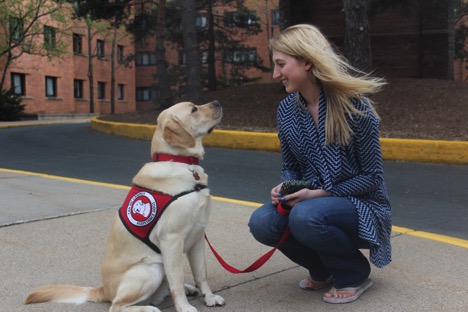Last fall, pre-vet sophomore Jennifer Warner walked her black labrador Rose to the Campus Connector.
As the bus stopped, Rose balked and her body tensed up. All that might be no big deal for a pet dog. But for Warner, it was a big opportunity to train Rose to board the bus calmly—a skill the dog would need if she were to become a service dog assisting with needs related to mobility, autism, hearing, seizures, and diabetes.

Warner is part of a new program at the University of Minnesota that pairs pre-veterinary students with dogs from Can Do Canines, a nonprofit based out of New Hope that provides service dogs. The partnership, known as the Fostering Education and Training Canines in Housing—the FETCH program—gives pre-vet students the opportunity to learn what service dogs do while Can Do Canines can use the university’s bustling campus to socialize their in-training pups.
“Overall, everybody who has been involved in the program has just really enjoyed their experience,” said Kristie Feist, the assistant department director for Housing and Residential Life (HRL) and the coordinator for the FETCH program.
To make FETCH a reality this fall, Can Do Canines partnered with not only HRL, but also the College of Veterinary Medicine; the College of Food, Agriculture, and Nutritional Sciences; and the Assistance Dogs Organization.
“Both the students and the partners we work with all have been extremely supportive of us,” Feist said, “so all around, I think everyone is really happy.”

In all, it takes about two years for a Can Do Canines dog to be ready for service, and FETCH is just one part of that training process. The dogs also move through foster homes and other programs similar to FETCH—some also take part in a prison puppy foster program that allows inmates to teach the dogs basic obedience, assisting skills and socialization. When all of the training is completed, the dogs are then assigned to an owner to assist with disabilities.
For pre-vet students, the opportunity to train dogs is an easy way to integrate their love for animals into learning about providing service for the disability community. The program is only open to a limited number of students and is housed in Bailey Hall on the St. Paul campus along with the pre-vet residential community.
“We’re lucky; everything is provided for us in the FETCH program,” Warner said, noting that the program gives them dog food, special treats, toys, a closet pet vacuum and bathing and grooming supplies.
Participants in FETCH are required to attend training sessions with Can Do Canines in addition to working and living with the service dogs. Warner and her roommate, Monika Bromschwig, a freshman who is also a FETCH participant, helped train Rose together in the fall of last semester. The dogs joined their busy schedules and tagged along to classes and around campus.
Rose was a “prison puppy,” so she was brought up in an environment that was highly structured, limited and predictable. The result was that when she left the prison program, everything seemed new.
To help Rose get over her fear of the Campus Connector, Bromschwig and Warner began walking her by it and rewarding her with treats as they passed. They would linger longer and longer until one day they simply went on and off of the bus with Rose. Over a few weeks, Rose began to understand the Campus Connector was a safe thing, a good thing.
One thing the students in the FETCH program have learned: Training a service dog is a big responsibility, one that people sometimes don’t understand. Despite the red “service dog” capes they wear, the dogs invariably draw admirers on street corners or in classes.
“Most of the time people will ask to pet, but we have to politely tell people not to,” Warner said.

All of Warner’s teachers quickly became used to the four-legged addition to their classrooms; most even welcomed the dogs and loved seeing them every week. The biggest issue in classes was sometimes the seats themselves. Because the dogs were supposed to lie down underneath the students’ seats during class, certain desk and aisle configurations made it more difficult for the dogs to find room.
After the fall semester, Rose moved onto the next step of her training and Bromschwig became a student handler for a yellow labrador named Watson. Although she was used to bringing a dog to class by that point, the act itself was still distracting. “Even in class, part of my brain is focused on him. It’s a little hard with that,” Bromschwig said.
Crowded Campus Connectors to and from classes made for even more crowded seating arrangements. Sometimes the service dogs would have to sit instead of laying down, making them more easily jostled by the bumps of the road; Bromschwig remembers having to hold Watson close to her so he wouldn’t fall over.
The time commitment—the dogs couldn’t be alone for more than eight hours—plus the simple act of loving and caring for a dog adds a lot the student schedule. While the students in it now have the option to reapply for next year, some aren’t sure because of the time commitment or because they want to look into other housing options besides Bailey Hall.
But still, the dogs were great: “Rose was a big cuddler,” Bromschwig said. “If you lay on the floor she would kind of snuggle next to you,”
For Warner, being a participant in the FETCH program helped her realize she did not want to go to veterinary school, but still wanted to work with animals, notably therapy animals.
“This program really focused me on service/therapy animals,” Warner said. “I was pre-vet, but I changed to the companion animal track. I didn’t want to go to vet school, but I want to work with animals.”
Get a glimpse of what the training looks like for Monika Bromschwig and her FETCH dog for the spring, Watson (plus a look at what comes after FETCH), through our photo essay.
Assisting reporting and writing by Lianna Matt.
Correction: An earlier version of the article incorrectly stated that Rose barked at the Campus Connector. It also incorrectly made a correlation between a Can Do Canine dog’s behavior and whether the dog was raised through foster homes or the prison puppy program. The article has been updated to reflect these changes.

